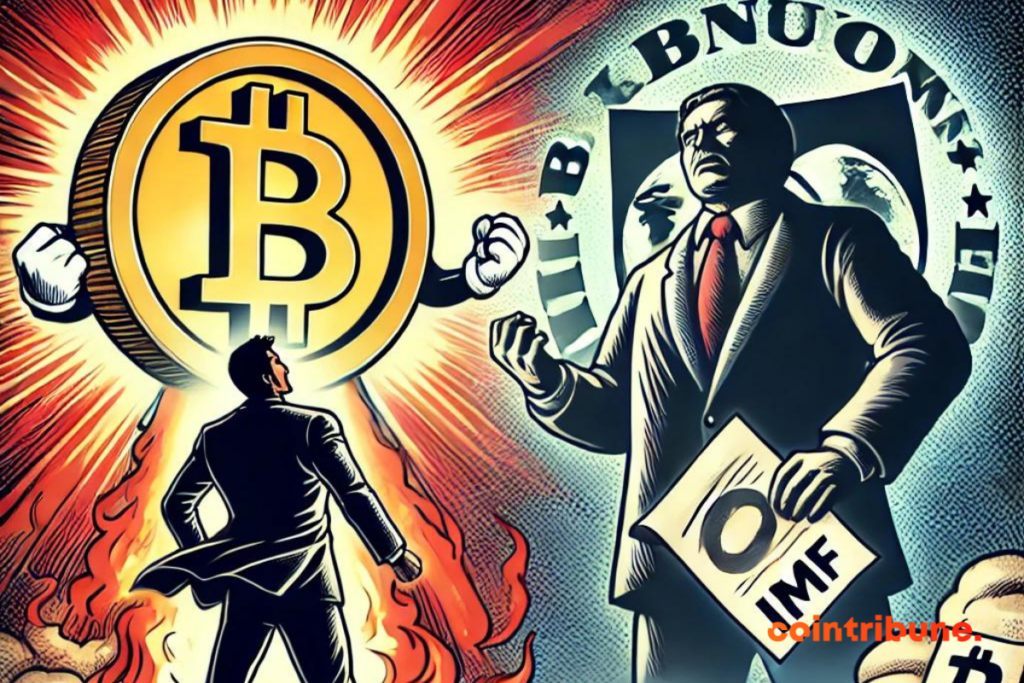Bitcoin and Carbon: An Expert Contradicts the IMF
Bitcoin finds itself once again at the heart of controversy. This time, the debate focuses on its environmental impact, fueled by a report from the International Monetary Fund (IMF) accusing bitcoin of significantly contributing to carbon emissions. However, a well-known Bitcoin advocate, Daniel Batten, does not agree with this perspective. With well-crafted arguments, he stands against the IMF’s claims, offering a response that deserves our attention. But who is right in this battle for ecological truth?

The IMF Report Under Fire
The IMF report does not mince words. According to it, Bitcoin mining and the growing use of artificial intelligence (AI) would result in a significant increase in global carbon emissions.
Faced with this supposed threat, the IMF advocates for the imposition of a “crypto-carbon” tax, a measure that would directly impact the sector’s key players. Yet, this analysis has sparked strong criticism, particularly from Daniel Batten, a staunch Bitcoin defender.
Batten refutes the IMF’s conclusions, calling them simplistic and based on outdated data. He accuses the institution of relying on inappropriate comparisons, equating the carbon footprint of Bitcoin mining to that of AI data centers without providing updated evidence.
This “guilt by association,” as he calls it, obscures the real differences between these two activities and, according to him, distorts the reality of Bitcoin’s environmental impact.
Bitcoin Mining: Guilty or Virtuous?
Contrary to the IMF’s allegations, Batten argues that Bitcoin mining has a decarbonizing effect on energy grids.
He relies on recent studies showing that Bitcoin mining, far from exacerbating the problem of carbon emissions, could actually contribute to a reduction in global emissions.
How is this possible? Simply because many Bitcoin miners now use renewable energy sources or capitalize on energy surpluses that would otherwise be wasted.
Batten also points out that Bitcoin mining fosters innovation in the energy sector. Indeed, the constant demand for cheap energy pushes miners to invest in more efficient technologies and collaborate with renewable energy producers.
This dynamic, argues Batten, could transform Bitcoin into a key player in the energy transition, rather than just a polluter.
A Biased Vision or a Salutary Warning?
However, the question remains: is the IMF report really as flawed as Batten claims, or does it point to a real problem that Bitcoin advocates prefer to ignore? Batten accuses the IMF of using discredited sources and hypothetical models that exaggerate Bitcoin’s environmental impact.
According to him, independent data shows that Bitcoin’s share of global electricity consumption and carbon dioxide emissions will decrease by 2027, contradicting the IMF’s alarming projections.
He goes further by calling for more honest and accurate research, insisting that the IMF report, as it stands, does not provide a reliable basis for policymakers.
Batten calls for a more nuanced debate, recognizing the challenges posed by Bitcoin mining but also its potential to contribute to a more sustainable energy economy.
The confrontation between the IMF and Bitcoin advocates reveals the tensions surrounding the environmental impact of cryptocurrencies.
While the IMF report raises legitimate concerns, Daniel Batten’s response shows that there are aspects of the debate that deserve deeper exploration. The future will tell whether Bitcoin will become a lever for energy transformation or if its detractors will continue to view it as an environmental burden. The dialogue around Bitcoin and its carbon footprint is just beginning.
Maximize your Cointribune experience with our "Read to Earn" program! For every article you read, earn points and access exclusive rewards. Sign up now and start earning benefits.

Fascinated by Bitcoin since 2017, Evariste has continuously researched the subject. While his initial interest was in trading, he now actively seeks to understand all advances centered on cryptocurrencies. As an editor, he strives to consistently deliver high-quality work that reflects the state of the sector as a whole.
The views, thoughts, and opinions expressed in this article belong solely to the author, and should not be taken as investment advice. Do your own research before taking any investment decisions.